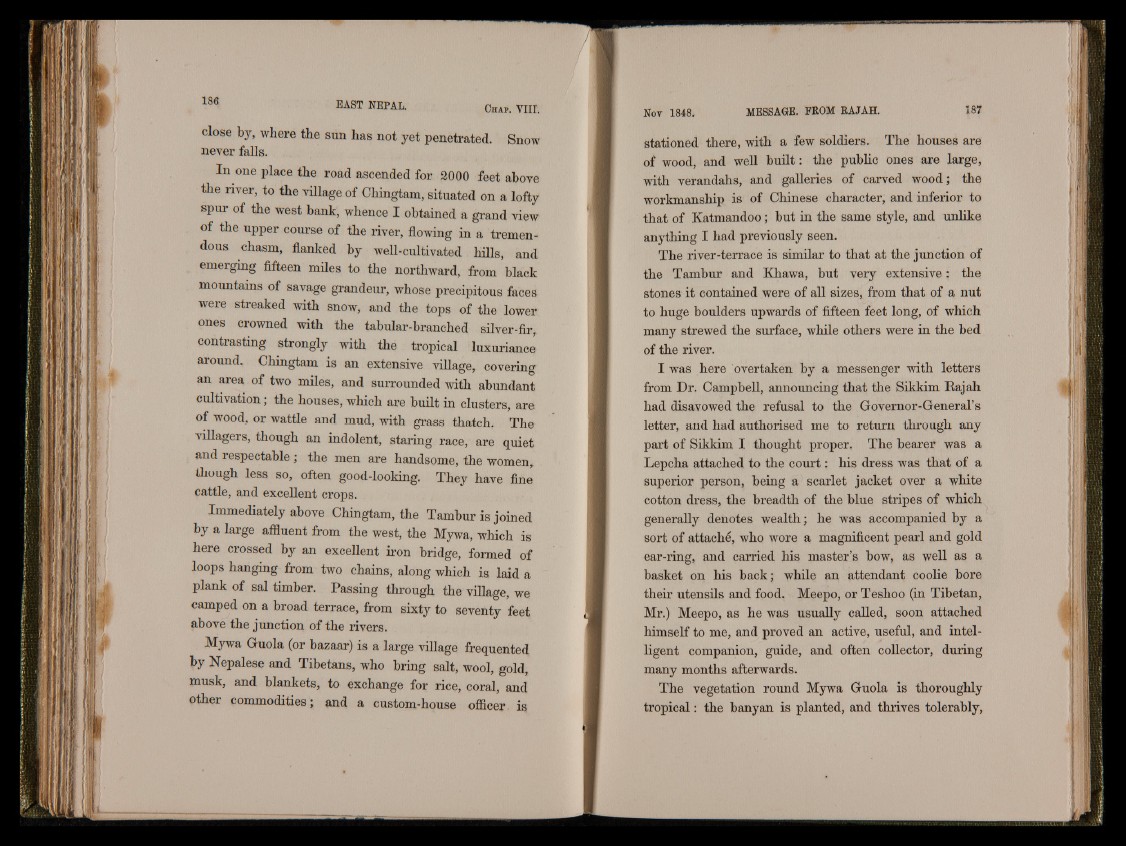
close by, where the sun has not yet penetrated. Snow
never falls.
In one place the road ascended for 2000 feet above
the river, to the village of Chingtam, situated on a lofty
spur of the west bank, whence I obtained a grand view
of the upper course of the river, flowing in a tremendous
chasm, flanked by well-cultivated lulls, and
emerging fifteen miles to the northward, from black
mountains of savage grandeur, whose precipitous faces
were streaked with snow, and the tops of the lower
ones crowned with the tabular-branched silver-fir,
contrasting strongly with the tropical luxuriance
around. Chingtam is an extensive village, covering
an area of two miles, and surrounded with abundant
cultivation; the houses, which are built in clusters, are
of wood, or wattle and mud, with grass thatch. The
villagers, though an indolent, staring race, are quiet
and respectable ; the men are handsome, the women,
though less so, often good-looking. They have fine
cattle, and excellent crops.
Immediately above Chingtam, the Tambur is joined
by a large affluent from the west, the Mywa, which is
here crossed by an excellent iron bridge, formed of
loops hanging from two chains, along which is laid a
plank of sal timber. Passing through the village, we
camped on a broad terrace, from sixty to seventy feet
above the junction of the rivers.
Mywa Guola (or bazaar) is a large village frequented
by Nepalese and Tibetans, who bring salt, wool, gold,
musk, and blankets, to exchange for rice, coral, and
other commodities; and a custom-house officer is
stationed there, with a few soldiers. The houses are
of wood, and well b u ilt: the public ones are large,
with verandahs, and galleries of carved wood; the
workmanship is of Chinese character, and inferior to
that of Katmandoo; but in the same style, and unlike
anything I had previously seen.
The river-terrace is similar to that at the junction of
the Tambur and Khawa, but very extensive: the
stones it contained were of all sizes, from that of a nut
to huge boulders upwards of fifteen feet long, of which
many strewed the surface, while others were in the bed
of the river.
I was here overtaken by a messenger with letters
from Dr. Campbell, announcing that the Sikkim Rajah
had disavowed the refusal to the Governor-General’s
letter, and had authorised me to return through any
part of Sikkim I thought proper. The bearer was a
Lepcha attached to the court: his dress was that of a
superior person, being a scarlet jacket over a white
cotton dress, the breadth of the blue stripes of which
generally denotes wealth; he was accompanied by a
sort of attache, who wore a magnificent pearl and gold
ear-ring, and carried his master’s bow, as well as a
basket on his back; while an attendant coolie bore
their utensils and food. Meepo, or Teshoo (in Tibetan,
Mr.) Meepo, as he was usually called, soon attached
himself to me, and proved an active, useful, and intelligent
companion, guide, and often collector, during
many months afterwards.
The vegetation round Mywa Guola is thoroughly
tropical: the banyan is planted, and thrives tolerably,